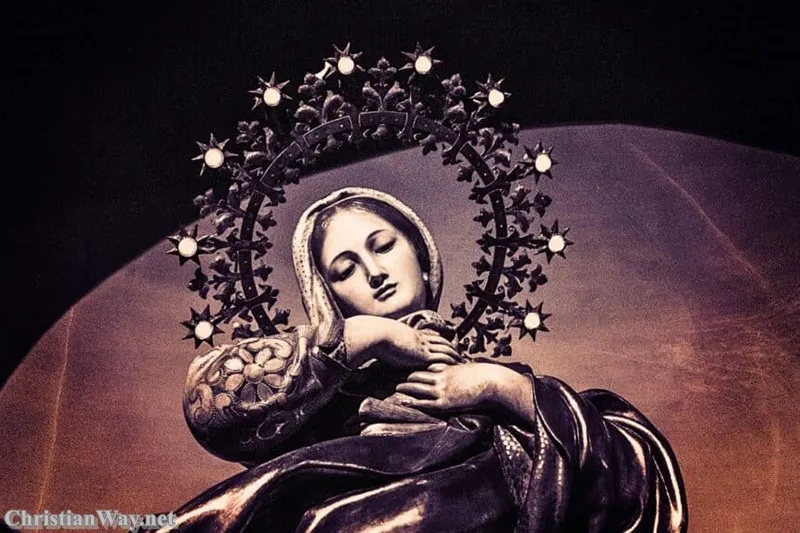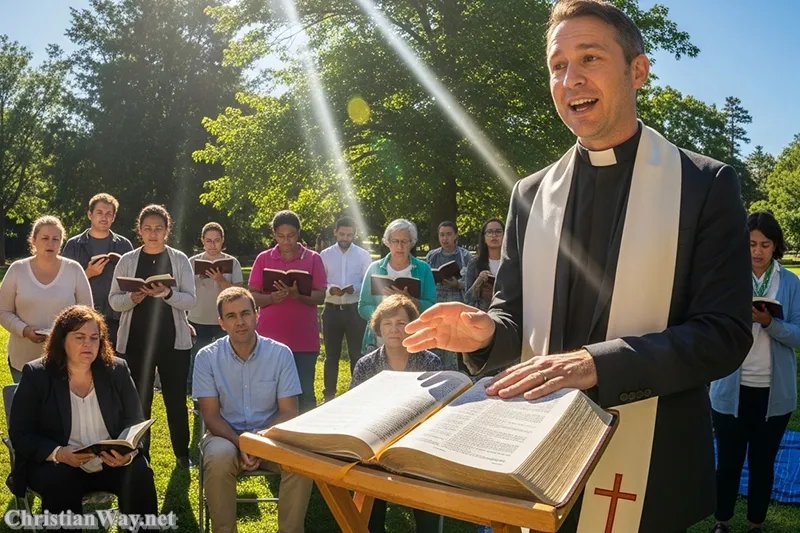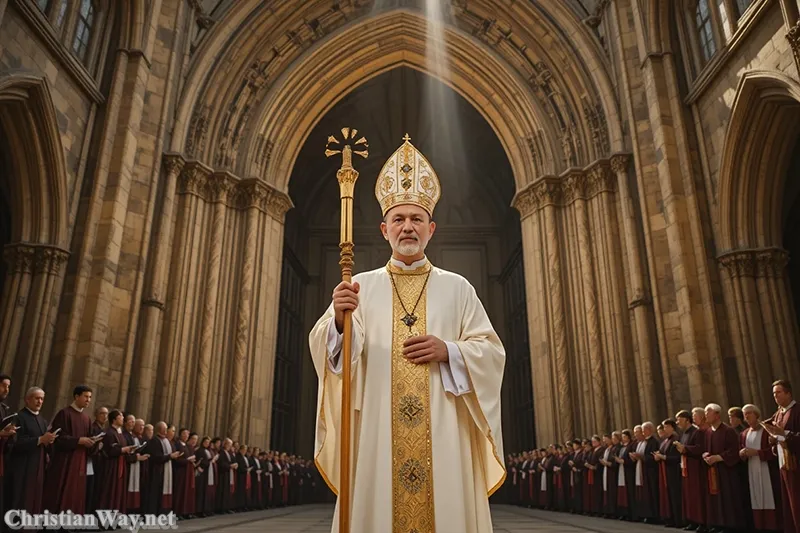Dear friends in Christ,
Every age of the Church is marked by both its struggles and its blessings — moments when division threatens the witness of the Gospel, and moments when the Spirit draws believers back into deeper communion with one another and with Christ. The longing for unity is written into the heart of every Christian. It is the same desire that moved our Lord to pray on the night before His Passion, “that they may all be one; as you, Father, are in Me, and I in You” (John 17:21). This prayer is not a distant ideal but a living call — a call that echoes in the story of the Anglican Communion and its vocation to reflect the unity of believers in the Body of Christ.

To speak of the Anglican Communion is to speak of a family — a worldwide fellowship of Churches rooted in Scripture, shaped by the creeds, and nourished by the sacraments. Yet, it is also to speak of the challenge of unity: how believers, dispersed across nations and cultures, can remain one in faith and love while honoring the diversity of their contexts. In our time, when differences often seem to define the human landscape, the Anglican story offers both a warning and a hope — that unity in Christ does not mean uniformity, and that true communion is found not in perfect agreement, but in shared grace.
The Meaning of Communion in Christ
At the heart of Christian faith lies the mystery of communion. The word itself, communio in Latin, points to a shared participation — a life held in common with God and one another. St. Paul reminds the Corinthians, “The cup of blessing that we bless, is it not a participation in the blood of Christ? The bread that we break, is it not a participation in the body of Christ?” (1 Corinthians 10:16). To be in communion, then, is to share in the very life of Christ, and through Him, to be bound to all who call upon His name.
For Anglicans, this understanding of communion is foundational. It is not merely an institutional bond or a system of governance, but a sacramental and spiritual reality. The Anglican Communion is a fellowship of autonomous Churches — each self-governing, yet united in their common faith, worship, and mission. This reflects the deeper truth that the Church is one Body with many members (1 Corinthians 12:12), a living organism animated by the Spirit rather than a centralized structure held by human authority.
The Eucharistic Vision of Unity
The Eucharist lies at the very heart of Anglican unity. Every Sunday, around countless altars across the world, Anglicans proclaim the same mystery: “We who are many are one body, for we all share in the one bread.” (1 Corinthians 10:17). In the Eucharist, the Church becomes what she truly is — the Body of Christ made visible. This sacramental reality transcends language, culture, and even theological differences.
In the early centuries, the unity of the Church was expressed above all through communion in the Eucharist and the shared confession of the apostolic faith. Anglicanism, in seeking to hold together Scripture, tradition, and reason, continues this ancient balance — affirming that unity is not a matter of agreement in all things, but of faithfulness to Christ who gathers His people from every nation.
The Origins and Nature of the Anglican Communion
The Anglican Communion arose not from a desire to separate, but from the unfolding of history. Rooted in the English Reformation of the sixteenth century, the Church of England sought to renew itself in the light of Scripture while preserving the catholic faith handed down from the apostles. From these beginnings, Anglicanism spread throughout the world — through mission, migration, and encounter — taking root in diverse lands and cultures.
By the nineteenth century, these Churches began to see themselves as part of one global family, bound together not by legal jurisdiction but by shared inheritance and mutual recognition. The first Lambeth Conference in 1867 gave voice to this sense of communion — a gathering of bishops seeking to discern how unity might be lived in a world already full of difference.
The Four Instruments of Communion
The Anglican Communion is held together by four key relationships, often called the Instruments of Communion:
- The Archbishop of Canterbury, who serves as a focus of unity — not as a ruler, but as a sign of communion and a servant of reconciliation.
- The Lambeth Conference, a decennial meeting of bishops for prayer and counsel.
- The Anglican Consultative Council, where laity, clergy, and bishops discern together the mission of the Communion.
- The Primates’ Meeting, bringing together the leaders of each autonomous province for shared reflection and guidance.
These instruments express a unique vision of unity — one not based on coercion, but on koinonia, mutual responsibility, and interdependence. The Anglican Communion, in this sense, is an embodiment of Christ’s prayer for unity — not as conformity, but as communion in love.
Unity Amid Diversity
One of the distinctive gifts — and challenges — of Anglicanism is its ability to hold together seemingly opposite realities: catholic and reformed, traditional and contextual, liturgical and evangelical. Within the Communion, there exists a wide spectrum of belief and practice, yet all are called to live within the same household of faith.
The Via Media: A Path of Reconciliation
Anglicanism often speaks of the via media — the “middle way.” This does not mean compromise for its own sake, but a commitment to balance and discernment. It is a recognition that truth is not always found in extremes, and that the Church must listen patiently to the voice of the Spirit speaking through the whole Body.
As the Book of Common Prayer so beautifully expresses, Anglicans are united in “the beauty of holiness” — worship that blends reverence with simplicity, Scripture with prayer, tradition with openness to the Spirit’s renewal. This way of faith allows the Anglican Communion to be at once ancient and living, rooted and yet responsive to the needs of each age.
Challenges to Unity
Yet, this very diversity can strain the bonds of communion. In recent decades, questions of doctrine, morality, and authority have tested the relationships among the provinces. Some have asked: How can a communion remain united when its members disagree on fundamental issues?
Here, the Anglican witness offers an important lesson: unity is not the absence of tension, but the perseverance of love. The Gospel calls believers not to deny their differences, but to bear them together under the cross. The apostle Paul reminds us, “Bear with one another in love, making every effort to maintain the unity of the Spirit in the bond of peace.” (Ephesians 4:2–3).
In this sense, Anglican unity is a form of spiritual discipline — a commitment to remain in relationship, even amid disagreement, trusting that the Spirit will lead the Church into all truth (John 16:13).
The Anglican Contribution to the Wider Christian Unity
The Anglican Communion does not see itself as an end in itself, but as part of the one, holy, catholic, and apostolic Church. Its unity, fragile and real, points beyond itself to the greater unity of all Christians.
Ecumenical Dialogue and Witness
For over a century, Anglicans have been deeply involved in the ecumenical movement — working with Catholics, Orthodox, and Protestants to restore visible unity among the followers of Christ. The Anglican-Roman Catholic International Commission (ARCIC), for example, has produced rich theological dialogues on topics like authority, Eucharist, and ministry. Similarly, Anglican-Orthodox and Anglican-Lutheran conversations have sought to build bridges of understanding and friendship.
These efforts arise not from institutional ambition but from fidelity to Christ’s will. The unity of believers is not a human project but a divine gift — a fruit of grace that calls for patience, humility, and prayer. As the Lambeth Conference once stated, “We believe that the unity of the Church is both the will of God and the gift of the Spirit.”
A Witness of Reconciliation in a Divided World
In a world often divided by ideology, politics, and fear, the Anglican Communion’s model of mutual respect and dialogue offers a living sign of reconciliation. Its existence across so many nations — in the Global North and South, East and West — bears witness to the Gospel’s power to gather diverse peoples into one fellowship.
Anglicans are called to embody what St. Paul proclaimed: “There is one body and one Spirit… one Lord, one faith, one baptism, one God and Father of all.” (Ephesians 4:4–6). To live this unity amid cultural and theological diversity is itself a form of mission — a proclamation of the peace that Christ gives to His Church.
Living the Unity of Believers
The unity of believers is not only a theological truth but a daily practice. It is lived in prayer, in service, and in the humble willingness to listen to others. Within every parish, unity is nurtured at the altar, where believers kneel side by side to receive the same Body and Blood of Christ.
Unity in Prayer and Worship
The Book of Common Prayer — perhaps the most unifying element in Anglican life — gives voice to this shared faith. Across the world, Anglicans pray in different languages and accents, yet the rhythms of morning and evening prayer, of confession and thanksgiving, bind them together. As one voice, they lift up to God the same petitions: for peace, for mercy, for grace to serve the poor and the suffering.
Through common prayer, Anglicans live out the reality that unity is not a human achievement but a gift received in worship.
Unity in Mission and Service
Unity also finds expression in mission — in the Church’s service to the world. Whether in schools, hospitals, or acts of justice and compassion, Anglicans are united by their call to witness to Christ’s love. When believers work together for the healing of creation and the dignity of every human life, they bear visible testimony to the truth of the Gospel.
A Vision for the Future
The path ahead for the Anglican Communion will not be without difficulty. The pressures of culture, the pain of disagreement, and the complexity of global life all test the bonds of fellowship. Yet, amid these challenges lies a profound opportunity — to rediscover the heart of communion in the simplicity of faith, hope, and love.
Unity begins not in documents or councils, but in hearts renewed by grace. When believers look upon one another and see Christ, when they forgive as they have been forgiven, the Church becomes a true sign of God’s kingdom on earth.
In this way, the Anglican Communion’s journey is a parable for all Christians — a reminder that the unity of believers is not the work of human consensus, but of divine love.
Reflect and Pray
The unity of believers, whether within the Anglican Communion or across the whole Body of Christ, is a sacred mystery. It calls us beyond ourselves — beyond pride, fear, and division — into the very heart of the Triune God.
Let us pray, then, for the grace to live as one:
Lord Jesus Christ, who prayed that Your disciples may be one, grant to Your Church the humility to listen, the courage to love, and the faith to trust in Your Spirit. May our communion reflect Your truth, and may our unity bear witness to Your peace, until the whole world knows the love of the Father who sent You. Amen.
— Fr. John Matthew, for Christian Way





